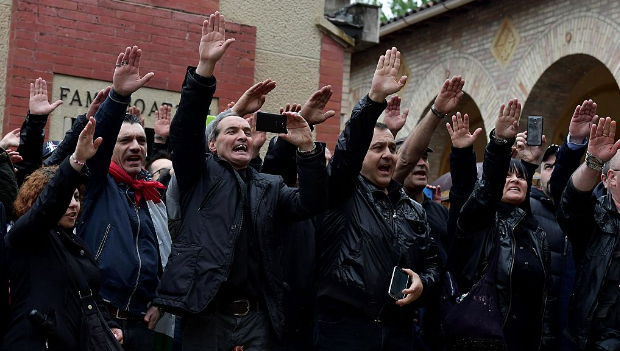Bulletin N° 754
Subject : Class Struggle: ‘The BIG LIE’ and microscopic desires of ordinary people.
May 27, 2017
Grenoble, France
Dear Colleagues and Friends of CEIMSA,
Today we are approaching the end of the 146th anniversary of the Paris Commune (which took place between March 18, 1871 and May 28, 1871). The notorious “Bloody Week,” when Versailles troops slaughtered 30,000 people in the streets of Paris began on May 21st and lasted until the 28th. This was class war at the birth a socialist republic – the enemy was a political economy controlled directly by workers themselves; it ended with a massacre, a desperate attempt at genocide to rid the world once and for all of an anti-capitalist ideology. What are the lessons from this state terrorism against workers: The pro-capitalist forces have been - and still are - deadly serious about keeping their control over society, and they remain willing and able to do whatever is necessary to achieve submission to their will.
Videos on the Paris Commune:
Lectures by University of Geneva historian, Henri Guillemin :
Ø https://www.youtube.com/results?search_query=henri+guillemin+la+commune+de+paris
“Bloody Week,” 21-28 May 1871 :
Ø http://www.onthisdeity.com/28th-may-1871-%E2%80%93defeat-of-the-paris-commune/
Mapping “Bloody Week” in the streets of Paris
Working in the same domain of historical reality, the revolutionary psychoanalyst Fléx Guatarri introduces us to “micro-politics” beneath the crushing wheels of capitalist machinations; he analyzes the historic use of ends to justify specific means, regardless of the consequences. In May 1973, Guatarri presented a paper at the Psychoanalysis and Politics Conference held in Milan, Italy. “The Micro-Politics of Fascism” was later published by Feltrinelli and Editions 10/18. [A copy of the entire book is now available on the internet. See link below.] Guatarri begins his discussion of fascism and micro-politics with the following observation:
Fascism is a key motif in considering the problem of desire in the social sphere. Surely, then, we should take occasion to talk about it while we are still free to do so.(Molecular Revolution: from Section 3,“Politics & Desire,” Part n°.3, “The Micro-Politics of Fascism”,p.217)
He then seeks to establish analytical precision by carefully defining his terms. First off, he wishes to dispel any illusions that concepts employed in psychoanalysis might be relevant to Marxist analysis.
The notion of a micro-politics of desire does not mean building a bridge between psychoanalysis and Marxism as static and independent theories. That seems to me neither desirable not possible. I do not believe any system of ideas can function in any meaningful way outside its original context, apart from the collective forces whose modes of expression have produced it. When I talk about ‘desire’, I am not borrowing the idea from orthodox psychoanalysis or the theories of [Jacques] Lacan. I make no claim to initiate a scientific concept, I am only trying to construct a possible theoretical framework in which to understand the way desire operates in the social sphere. Though it is hardly possible to speak of pleasure or enjoyment in the same breath as revolution – there is no such thing as “revolutionary pleasure” or ‘revolutionary enjoyment’ – no one today would be surprised by such terms as ‘desire for revolution’ or ‘revolutionary desire’. This seems to me to be due to the fact that what we normally mean by pleasure and enjoyment is inseparable from a particular form of individuation of super-solitary subjectivity which finds fulfillment of a kind on the analyst’s couch. Libido and desire are very different from that.
Desire is not intrinsically bound up with the individuation of the libido. A desire machine encounters forms of individuation – in other words of alienation. Desire is not a Platonic ideal, nor is its repression : there is no such thing as desire or repression in itself. The idea of a ‘perfect castration’ belongs among the worst reactionary mystifications. Desire and repression operate in society as it is, and are affected by its every changing phase; so we are not dealing with general categories that can be applied indiscriminately to every situation.
The distinction I propose between the micro-politics and macro-politics of desire should work to some extent to abolish the supposed universality of the models presented by psychoanalysts and used by them as defence against all social and political contingencies. It is assumed that psychoanalysis relates to what is going on in the small world of the family and the person, while politics concern only the broad social sweep. I want to show that, on the contrary, there are some politics which deal quite as much with the desire of the individual as with the desire apparent in the wider world of society. These can take two forms: either a micro-politics concerned with both individual and social problems, or a macro-politics with the same range of concerns (individual, family, Party, State and so on). The despotism so often prevailing in marital or family relationships grows out of the same type of libidinal engagement as despotism in society. Similarly, it is far from absurd to consider quite a number of large-scale social problems – such as those of bureaucratism or fascism – in the light of the micro-politics of desire. Consequently, the problem is not one of linking up disparate domains that fully exist in their own right and are separate from one another, but of setting up new theoretical and practical machines capable of sweeping away earlier stratifications and creating the conditions necessary for desire to function in a new way. We have not merely to describe pre-existing social entities, but also to intervene actively against all the machines of the dominant power – the power of the bourgeois State, of all forms of bureaucracy, of the school, of the family, the dominance of the male in the couple, and even the repressive power of the super-ego in the individual. (pp.217-218)
Guatarri goes on to describe three ways that the problem of fascism has been studied: the sociological method, which he calls “the analytical formalist approach,” by which students of fascism set out to identify common features and specific differences, by either (a) the use of analogies – for instance the similarities and small relative differences represented by three types of European fascism: Italian, German, and Spanish; or (b) by using structural homologies to establish absolute differences, say between fascism, Stalinism, and the Western democracies. By contrast, the neo-Marxist approach never separates the theoretical description from revolutionary praxis. However this second method, according to Guatarri comes up against an insurmountable barrier, which is “the difference between the real desire of the mass of the people and the spokesmen who are supposed to represent them.”
The sociological way of thinking advances by reifying social entities and failing to recognize people’s desire and creativity; the revolutionary Marxist thinking tries to overcome that failure, but sets itself up as a collective system to represent the desire of the people. It only recognizes the existence of revolutionary desire to the extent that it can channel it into being represented theoretically by Marxism and in practice by the party that supposedly expresses it. Thus a whole system of drive belts is set up to link the theory, the party leadership and militants, with the result that the endless variegation that diversifies the desire of the people becomes ‘massified’, reduced to certain standardized phraseology, the necessity for which is supposedly justified on the ground of working-class solidarity and the unity of the party. From the impotence of a system of mental representation we come to the impotence of a system of social representation. Nor is it coincidence that this neo-Marxist method of thinking and action becomes bogged down in bureaucratic procedure; it is due to the fact that it has never really freed its pseudo-dialectic from the inveterate dualism between representation and reality, between the lofty cast of those who preach the word and give the orders and the mass of the people whom they are supposedly teaching. We find this over-simplifying dualism among neo-Marxists in all their ideas: it affects their concept of the schematic opposition between city and countryside, their international alliances, their political theory of the peace camp versus the war camp, and so on. This systematic bi-polarization of every problem always centers upon a third term, but one not thereby constituting a dialectical synthesis; That third term essentially involves power, first and foremost, State power, and the power of the party which hopes to gain control of it. Every partial struggle always bears a relationship to this type of transcendent third term; everything gains its meaning from it, even when the cold light of history reveals it for what it is – a delusion, of just the same kind as the phallic object of the Oedipal triangle. It might be said of this dualism, and the transcendent object it set up, that they represent the core of the revolutionary Oedipus that confronts the political analyst.(pp.218-219)
The third approach, which is the one advocated by Guatarri, is (c) the “analytic-political approach”, which he stresses is “inseparable from a politics of analysis [and] must refuse to tolerate the persistence of the traditional dichotomy between large social bodies and the problems people face as individuals, in their families, schools, jobs and so on.”(p.219)
There must be no question of its automatically adapting its approach to problems of concrete situations to fit any goodies-and-baddies assumption about classes or camps, or of trying to find all the answers via the action of a single revolutionary party seen as the central depository of all truth, theoretical and practical. The micro-politics of desire, therefore, would no longer aim to represent the people and interpret their desire. This is not to say that all party action, all thought of a party line or programme, or even all centralism should be rejected out of hand; but the aim would be to see what people actually do, in the context of, and in relation to, an analytic practice ever more firmly opposed to the repressive actions, the bureaucratism, the moralizing Manicheism infecting current revolutionary movements. No transcendent object would then be needed as a basis or a security, nor would the micro-politics of desire remain centered upon a single point, such as, for instance, State power and construction of a representative party capable of winning it for and on behalf of the mass of the people. On the contrary: a multiplicity of objects would be established within the immediate reach of the most varied social groupings. It is only on the basis of an accumulation of partial struggles (though the word ‘partial’ is misleading, since they are not parts of any already existing whole) that collective, large-scale struggles can be undertaken.(pp.219-220)
This book is certainly a must read (or re-read) for anyone who is interested in the potential for social movements to affect revolutionary changes in contemporary society. Guatarri has a respect for the creativity of ordinary people, and a healthy disdain for the laziness of would-be despots, who after all are the product of severe repressions themselves. The multitude of desires in society, he foresees, will eventually converge if properly nurtured and constitute our much-wished-for new society. For this to happen, the fascist castration machine must be stopped at every level, so that the power of the people is felt and appreciated.
There are many different ways of approaching these problems of desire in the social sphere. One may quite simply fail to recognize them, or reduce them to over-simplified political alternatives. One may equally try to discover their mutations, their displacements and the fresh possibilities that they offer for revolutionary action. Stalinism and fascism have long been considered as proceeding from radically different definitions, where as the various types of fascism have been classed under the same heading. Yet there can be greater differences within fascism than there are between some aspects of Stalinism and some aspects of Nazism; Without forcing comparisons or ending up with the kind of amalgams produced by Hannah Arendt that jean-Pierre Faye takes exception to [in his book, La Critique du langue et son économie, Galilée, 1973], it is impossible not to accept the continuity of one and the same totalitarian machine, worming its way through all the structures of fascism, Stalinism, bourgeois democracy and so on. Without going back as far as Diocletian or Constantine, we can trace its ancestry in the context of capitalism from the repression of the Paris Communards in 1871 to the forms it takes today. The different totalitarian systems have produced different formulae for controlling the desire of the masses, to suit the changes in productive forces and production relations. We have to try to analyze its ‘machinic composition’ – which is a bit like analyzing something’s chemical composition, but in this case it is a social chemistry of desire running not only through History, but also through the whole expanse of society.
The historical ‘transversality’ of the desire machines on which totalitarian systems are based is inseparable from their social transversality. The analysis of fascism cannot be left just to the historian, because the processes established by it in the past are, as I say, still proliferating in different forms throughout the entire expanse of society today. There is a totalitarian chemistry at work in our State structures, our political and trade-union structures, our institutional and family structures, even in our individual structures – in the sense that one can, as I have suggested, talk of guilt-feelings and neurosis as a kind of fascism of the super-ego.(pp.222-223)
The battle being waged today, in Guatarii’s terms, is not only a struggle over rates of capitalist profit and degrees of labor exploitation, but also over the production and destruction of authentic desires. He gives a convincing analysis of the forces at play in the political crystallizations of liberal capitalism, soviet communism, German Nazism, and American neo-conservatism. The submission of the masses to the will of a small minority is a ‘historical constant’; only the means to this end have necessarily changed over time - not because of ideological modifications, but due to changes in the means of production. What the slaves of antiquity did in order to avoid the lash, Soviet communists did out of fear, German Nazis from esprit de corps, and we in the 21st century do to avoid feelings of guilt. In attempting to answer the question, why Hitler and not a military dictatorship in 1933? Guatarii evokes the character structure of Reinhard Heydrich (1904-1942) - son of the famous German composer and opera singer Richard Bruno Heydrich – who at an early age became the principle architect of the Nazi genocide policy, “The Final Solution.” With an unusual sadistic flare, the young Reinhard Heydrich and people like him were able to control the masses more completely through counter-intuitive police actions than any military dictatorship could have accomplished. One of his methods used for crushing the opposition, for instance, was to increase food rations at the same time as he orchestrated mass arrests and murder. Popular desires were largely paralyzed by such acts of “solidarity”; docility and willful collaboration ruled the German population from within. Today, under the despotism of neo-conservatism, capitalism flourishes when the super-ego dictates the desires we are all more or less formatted to internalize, and deviations from the strict production-consumption program frequently often meet with painful feelings of inadequacy and guilt, which in turn are expressed in various ways, not always to our benefit but usually in ways that perpetuate the functions of the exploitative system of which we are a part.
For more on the problematic of social control systems, see our November 29, 2014 CEIMSA Bulletin N° 636, and, as indicated above, the complete text of The Molecular Revolution can now be found on the Internet at : https://machinicunconsciousmachine.files.wordpress.com/2014/02/molecularrevolutions.pdf
The 22 items below should help readers understand how they have become bogged down in the deceitful operations of monopoly capitalism, in which private-profit interests attempt to control virtually every aspect of our lives (and our deaths).
Sincerely,
Francis Feeley
Professor emeritus of American Studies
University Grenoble-Alpes
Director of Research
University of Paris-Nanterre
Center for the Advanced Study of American Institutions and Social Movements
The University of California-San Diego
a.
“Who Really Controls America”
https://www.youtube.com/watch?v=hYIC0eZYEtI&index=1&list=PL63B8B82FC6DB35F2
by George Carlin
===========
b.
Sheriff David Clarke is a dangerous bigot. He must be resisted at every turn
by Patrisse Cullors
===========
c.
Seth Rich, Craig Murray and the Sinister Stewards
of the National Security State

http://www.informationclearinghouse.info/47082.htm
Why is it a “conspiracy theory” to think that a disgruntled Democratic National Committee staffer gave WikiLeaks the DNC emails, but not a conspiracy theory to think the emails were provided by Russia?
Why?
Which is the more likely scenario: That a frustrated employee leaked damaging emails to embarrass his bosses or that a foreign government hacked DNC computers for some still-unknown reason?
===========
d.
Getting Julian Assange: The Untold Story

http://www.informationclearinghouse.info/47097.htm
by John Pilger
Julian Assange has been vindicated because the Swedish case against him was corrupt. The prosecutor, Marianne Ny, obstructed justice and should be prosecuted. Her obsession with Assange not only embarrassed her colleagues and the judiciary but exposed the Swedish state’s collusion with the United States in its crimes of war and “rendition”.
Had Assange not sought refuge in the Ecuadorean embassy in London, he would have been on his way to the kind of American torture pit Chelsea Manning had to endure.
===========
e.
Why The U.S. Really Attacked Syrian
Militia Convoy
http://www.informationclearinghouse.info/47085.htm
by Robert Fisk
Exclusive: For the Pentagon to suggest that this was a sideshow to Washington’s battle against Isis was to stretch the truth beyond credibility
===========
f.
Trump in Saudi Arabia: More U.S. Weapons for Devastating Yemen War

Medea Benjamin
Co-founder of Code Pink and author of "Kingdom of the Unjust: Behind the U.S.-Saudi Connection," says President Donald Trump's visit to Saudi Arabia deepens a "toxic" tie between Washington and the House of Saud
===========
g.
Trump Is About To Really Mess Up In The Middle East
http://www.informationclearinghouse.info/47119.htm
by Robert Fisk
There
he was talking of the 'ultimate deal' between Israel and the Palestinians – as
if peace was just a commodity to be bought or sold
In
Riyadh, Trump couldn’t mention where most of the the 9/11 hijackers came from
or whose Sunni cult-faith was the inspiration for Isis – nor which country
chopped off heads with Isis-like relish. (Answer: Saudi
Arabia). And when he arrived in Israel on Monday, Trump was faced
with a new censorship protocol: don’t mention who was occupying whose property
in the West Bank or which country was outrageously and continuously stealing
land – legally owned by Arabs – for Jews and Jews only. (Answer: Israel).
So bingo, in the biggest Middle East alliance ever created in history, the Saudis and the other Sunni Arab dictators and America’s crackpot President and Israel’s cynical Prime Minister have all agreed on the identity of the devil country they can all curse with one voice, inspirer of “world terror”, instigator of Middle East instability, the greatest threat to world peace: Shia Iran
===========
h.
Manchester Attacks: What Price
Hypocrisy?
http://www.informationclearinghouse.info/47118.htm
by
John Wight
The lack of a coherent anti-terrorism strategy in Washington and by extension the West, as emergency services deal with the devastating aftermath of yet another terrorist atrocity in Europe – this time a suicide bomb attack at a concert in Manchester, England – has been thrown into sharp relief during President Trump’s tour of the Middle East.
Specifically, on what planet can Iran be credibly accused of funding and supporting terrorism while Saudi Arabia is considered a viable partner in the fight against terrorism? This is precisely the narrative we are being invited to embrace by President Trump in what counts as a retreat from reality into the realms of fantasy, undertaken in service not to security but commerce.
===========
i.
Truth Struggling

http://www.informationclearinghouse.info/article9531.htm
by John Pilger
In all the coverage of the bombing of London, a truth has struggled to be heard. With honourable exceptions, it has been said guardedly, apologetically. Occasionally, a member of the public has broken the silence, as an East Londoner did when he walked in front of a CNN camera crew and reporter in mid-platitude. "Iraq!" he said. "We invaded Iraq and what did we expect? Go on say it."
===========
j.
We Know What Inspired the Manchester Attack, We Just Won’t Admit It
by PATRICK COCKBURN
In the wake of the massacre in Manchester, people rightly warn against blaming the entire Muslim community in Britain and the world. Certainly one of the aims of those who carry out such atrocities is to provoke the communal punishment of all Muslims, thereby alienating a portion of them who will then become open to recruitment by Isis and al-Qaeda clones.
===========
k.
Scahill & Greenwald: What If All Victims of War Received the Media Attention of Manchester Victims?
https://www.democracynow.org/2017/5/25/scahill_greenwald_what_if_all_victims
===========
l.
Can Europe Stop the Far Right if It Doesn't Stop Neoliberal Austerity?
https://www.youtube.com/watch?v=5FjKuvkq_ik
As a second German soldier is arrested in an alleged plot to frame Syrian refugees for a shooting attack, Liz Fekete of the Institute of Race Relations in London says Europe's far-right movements are fueled in part by the impacts of neoliberal austerity.
===========
m.
All Power to the Banks! The Winners-Take-All Regime of Emmanuel Macron
by DIANA JOHNSTONE
A ghost of the past was the real winner of the French presidential election. Emmanuel Macron won only because a majority felt they had to vote against the ghost of “fascism” allegedly embodied by his opponent, Marine Le Pen. Whether out of panic or out of the need to feel respectable, the French voted two to one in favor of a man whose program most of them either ignored or disliked. Now they are stuck with him for five years.
===========
n.
Trump: ‘We Will do Whatever is Necessary’ to ‘Fix’ Venezuela
http://www.informationclearinghouse.info/47092.htm
by Ryan Mallett-Outtrim
US President Donald Trump said Thursday he would work with Colombia to “fix” Venezuela, as he slapped Caracas with new sanctions.
===========
o.
NATO WOOS TRUMP WITH 9/11 WRECKAGE
https://www.bitchute.com/video/8yBikiyObcI/
by James Corbett
===========
p.
Exxon Climate Change Cover Up: What Did Exxon and CEO Rex Tillerson Know and What Did They Do About It?
http://therealnews.com/t2/index.php?option=com_content&task=view&id=31&Itemid=74&jumival=19182
Rex Tillerson now
acknowledges climate change science, but as CEO of Exxon Mobile did he do
anything about it? The New York State Attorney General wants to know says
Investigative journalist David Hasemeyer
===========
q.
Exclusive: Dilma Rousseff on Her Ouster, Brazil's Political Crisis
& Fighting Dictatorship
https://www.democracynow.org/2017/5/26/exclusive_dilma_rousseff_on_her_ouster
